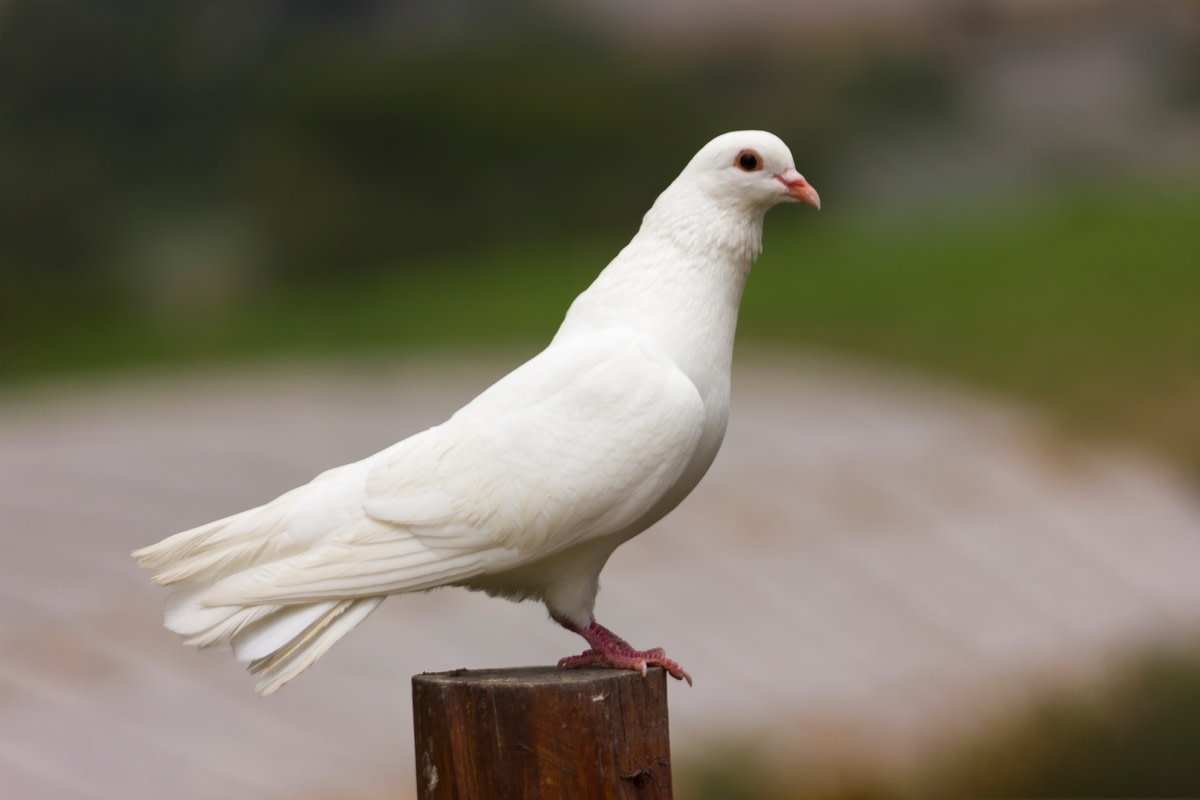
Why Does My Dove Have a Scaly Beak?
Image via Shutterstock/Renhue
My Dove Has a Scaly Beak and Is Acting Sick: What Is the Cause?
“My Java dove died a few weeks ago from old age, leaving us with only one bird, Julius. He was quiet, sad, and depressed, so we went to where we acquired him 10 years ago and brought home their only Java dove, Roger. Roger is also 10 years old, but his/her actual sex is unknown.
Roger has been with us for about 3 weeks now. He and Julius have large side-by-side cages. Each has their own perch, nest box food dish, and water bottle. They talk to each other and have been eating, drinking, and acting fine. Until today… I went to get them out for some pictures and noticed Roger was on his perch with both wings pointing down. He had his tail up, eyes almost shut, and he keeps shaking head like he is trying not to fall asleep.
He let me hold him fine, but he has something on his beak, which looks like calcium. Julius is fine. He has never been ill in 10 years and doesn’t sleep much at night. Roger lived in a barn, alone before he came here. I don’t know what to do for him. I’m sending pictures. Julius is in top, Roger sickly on bottom. Please help.” – Kelly
Image via owner

See an Avian Veterinarian
If you have an avian veterinarian available, you should take Roger in for an examination so that the infection on his beak can be examined. This is not something that should wait, so please tell the veterinary receptionist you think your bird has a severe respiratory infection and needs to be seen immediately. The veterinarian will be able to determine how well your bird is breathing and be able to do a physical exam to determine the severity of the infection.
If you do not have a veterinarian in your area, you may be able to treat him at home for the problem on the beak. However, if he has a generalized infection and not just a local infection, which is all that I can see from the photo, he may not make it. Birds have a very shallow respiratory system, much less than that of mammals, and an infection that we can live with will be fatal to a bird.
The symptoms you are describing point to a generalized infection. Sick birds tend to stand in that position to breathe a little better, bob their tails, have ruffled feathers to try and maintain their body heat, and may appear sleepy or lethargic. If you do not have a veterinarian available, you can get doxycycline from a local pet store (it is an antibiotic used to treat fish) if you can weigh him accurately to get a proper dose. If your bird has a respiratory infection like Aspergillosis or air sac mites, however, he will need supportive care as well as the appropriate medication.
The dose of doxycycline is 130 milligrams per kilogram of body weight added to the water each day. (1) If you do not have a veterinarian available and need to use this product, send us a follow-up question, and I will be glad to figure the dose depending on the strength you have available. A liquid form is also available in some feed stores to treat respiratory infections in chickens, so just let us know which product you can find.
Fungal Infection in Birds
The plaque on the beak appears to be a fungal infection. It is also possibly an early scaly face mite infection, but based on his age, the fact that it is not affecting his face, and because he does not have contact with other birds, that is unlikely. (You can call the place where you brought Roger home from and ask if any of their other birds are ill. Even if he was alone as you mentioned, have they found any wild birds dead on the barn floor?)
To treat the local infection on the beak, you can use one of the topical anti-fungal medications like clotrimazole or ketoconazole. There are several types of fungus that can appear similar to that, but if you are not able to have it diagnosed, the treatment for most of them is the same. This is not an emergency since the scale does not appear to be affecting his nostrils, but please take him in for an exam if at all possible.
You can find some anti-fungal medications at your local drug store. There are several products that are available without a prescription.
Source
Soh HY, Tan PXY, Ng TTM, Chng HT, Xie S. A Critical Review of the Pharmacokinetics, Pharmacodynamics, and Safety Data of Antibiotics in Avian Species. Antibiotics (Basel). 2022 May 31;11(6):741. doi: 10.3390/antibiotics11060741. PMID: 35740148; PMCID: PMC9219738. https://www.ncbi.nlm.nih.gov/pmc/articles/PMC9219738/
This article is not meant to substitute for diagnosis, prognosis, treatment, prescription, or formal and individualized advice from your veterinarian. Animals exhibiting signs and symptoms of distress should be seen by a veterinarian immediately.
© 2024 Mark dos Anjos, DVM

